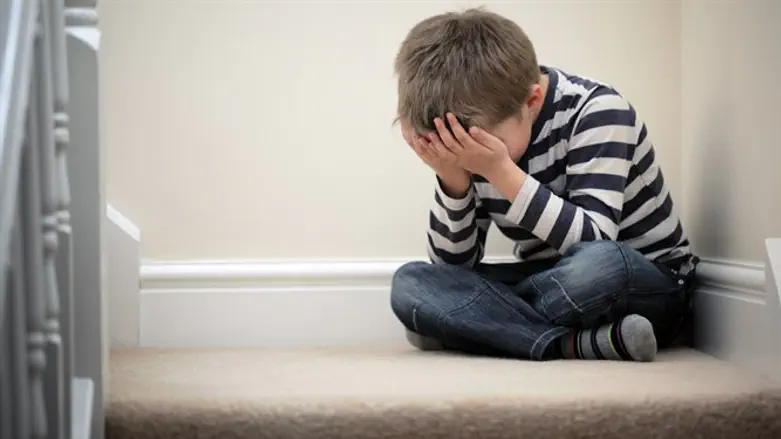
Divorced fathers in Israel recently began holding weekly protests outside Tel Aviv's court after Israeli judges jailed a lawyer and two reporters for exposing a social worker's injustices.
The three had claimed father's rights and children's rights are being violated, since the court deprives children of building a relationship with their fathers by forcing them to meet in a supervised center, instead of a more natural setting. One of the journalists was jailed for publishing voice recordings and videos of a social worker.
One grandmother, Sarah, explained that during divorce "the father accuses the mother, the mother accuses the father" and "if there's no proof, then there's no reason for children to have to go through this. It's very traumatizing, especially for boys. They tell their social worker that they want to go their father for Shabbat (Sabbath), and they're not allowed to."
The group aims to push a bill which would mandate that child custody arrangements be settled at the time of divorce.
Currently, couples can divorce without agreeing on child custody. In those cases, the children will see their non-custodial parent in a supervised "contact center" only, until the agreements are finalized. Too often, the custodial mother uses this clause to her benefit, delaying custody agreements for months or even years, while forcing the children and their father to meet only rarely, always supervised, and in an unnatural situation.
Sometimes, the mother chooses not to honor the agreement, or not to bring all the children, and the session is not made up for. If the mother refuses to bring the children for several weeks in a row, social workers will insist on "restarting the procedures" to allow the children to meet their father in the supervised contact center, since the "children have not seen their father in a long time."
Fathers who cannot handle the emotional pain of such a forced connection - especially when they see that their children are being abused by their mother, and knowing their own hands are tied - throw up their hands and stop coming.
Another issue is that if the father is not earning enough to pay child support, the court will forbid him from seeing his children "since he has no means to support them" and seeing their father in such a state "is harmful to their health."
Men in this situation will often not see their children for months on end.
When their finances straighten out, they face an additional issue: The supervised visits need to be "rethought," since there was a long break. This process of re-examining the visits naturally takes between a few weeks to a few months, during which time the father still is not allowed to see his children.
"I went there, and they were sitting down having pizza [in the contact center]," Sarah said. "I came in and my granddaughter said she had to go to the bathroom. She went and called her mother. I guess the mother warned her that if I came she should call us."
"Then the contact center's social worker came and made the father and the kids pack up and go back, before the session was supposed to end.
"But the whole point is that the mother doesn't want the father to get the children. She has no reason for him to continue seeing them in the contact center."
When asked how the contact center works, Sarah explained, "He has to be there for the first fifteen minutes. Then he can take them somewhere for an hour before he has to go back to the center for the last fifteen minutes."
One hour, including travel time, isn't enough to do anything, unless you're in a big city, but Sarah explained that the issue isn't just travel time - it's also that fathers only have the "right" to take their children out of the contact center after they've been going to the center consistently for a while.
"We were pushing for visitation rights, overnight visitation rights - Shabbat, holidays, and so on, so children will continue to have a normal relationship with thejir father," Sarah explained.
"So now this social worker has come up with another idea. She's a feminist, most social workers are - and she wants the children to continue in the contact center a few times and 'then we'll see.' The father wants to visit them in Jerusalem, outside the contact center. He himself lives in Tel Aviv, but the children and his ex-wife live in Samaria.
"The social worker said its too complex for him to see the children in Jerusalem. When he suggested holding the visits in a community center, the social worker suddenly decided it was too complex."
Sarah's grandchildren have no rights, she explains, since "Israeli civil law does not protect anyone living in Samaria. They are protected in Samaria by military law, municipal law. But civil law cannot protect them in any case. Only the United Nations maybe can help. So I'm...pushing for my grandchildren."
"We've asked my lawyer to sue the social worker for...violating...my grandchildren's rights. My grandchildren want to go to their father, and they're asking to go him. The father wants a court order to take his children to a child psychologist. But too many times the court doesn't even look at the psychological report, they just go by what the social worker says.
"A month ago, my granddaughter came early to the contact center, and told her father she had a phone. He gave her his phone number and since then hes been trying to get in touch with her... He couldn't contact her, and when he saw her again, she said the phone is broken."
Sarah wants to found a children's activist group - for all children.
"These children's rights are being violated," she said. "Human rights is very global, its very strong - they often have good goal, good power."
"Our whole goal is to get a new bill passed to establish visitation rights at the time of divorce or very shortly thereafter. Until they decide on visitation rights they make the father go to a contact center, and then they drag it out for a long time.
"One father i know finally got visitation rights after three years in a supervised contact center. Another father stopped coming to the center after six months. He can't anymore. He's had it, he wants visitation rights, and guessed that stopping would help him get visitation rights.
"Our protest is held every Thursday outside the Tel Aviv courthouse at 5:00 p.m.
"The more people we can bring in, the more power we have."
